新概念英语第二册课文详解
(完整版)新概念英语第二册课文及翻译(最新整理)
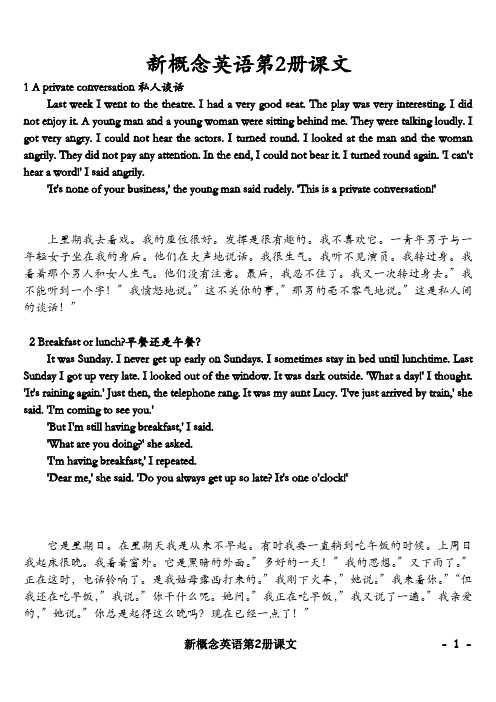
新概念英语第2册课文1 A private conversation私人谈话Last week I went to the theatre. I had a very good seat. The play was very interesting. I did not enjoy it. A young man and a young woman were sitting behind me. They were talking loudly. I got very angry. I could not hear the actors. I turned round. I looked at the man and the woman angrily. They did not pay any attention. In the end, I could not bear it. I turned round again. 'I can't hear a word!' I said angrily.'It's none of your business,' the young man said rudely. 'This is a private conversation!'上星期我去看戏。
我的座位很好。
发挥是很有趣的。
我不喜欢它。
一青年男子与一年轻女子坐在我的身后。
他们在大声地说话。
我很生气。
我听不见演员。
我转过身。
我看着那个男人和女人生气。
他们没有注意。
最后,我忍不住了。
我又一次转过身去。
”我不能听到一个字!”我愤怒地说。
”这不关你的事,”那男的毫不客气地说。
”这是私人间的谈话!”2 Breakfast or lunch?早餐还是午餐?It was Sunday. I never get up early on Sundays. I sometimes stay in bed until lunchtime. Last Sunday I got up very late. I looked out of the window. It was dark outside. 'What a day!' I thought. 'It's raining again.' Just then, the telephone rang. It was my aunt Lucy. 'I've just arrived by train,' she said. 'I'm coming to see you.''But I'm still having breakfast,' I said.'What are you doing?' she asked.'I'm having breakfast,' I repeated.'Dear me,' she said. 'Do you always get up so late? It's one o'clock!'它是星期日。
新概念英语第二册Lesson+86+Out+of+control+课文讲解讲义

新概念英语第二册第86课Lesson 86 Out of control 失控As the man tried to swing the speedboat round, the steering wheel came away in his hands. He waved desperately to his companion, who had been water skiing for the last fifteen minutes. Both men had hardly had time to realize what was happening when they were thrown violently into the sea. The speedboat had struck a buoy, but it continued to move very quickly across the water. Both men had just begun to swim towards the shore, when they noticed with dismay that the speedboat was moving in a circle. It now came straight towards them at tremendous speed. In less than a minute, it roared past them only a few feet away. After it had passed, they swam on as quickly as they could because they knew that the boat would soon return. They had just had enough time to swim out of danger when the boat again completed a circle. On this occasion, however, it had slowed down considerably. The petrol had nearly all been used up. Before long, the noise dropped completely and the boat began to drift gently across the water.New words and expressions 生词和短语swing v. 转向speedboat n.快艇desperately adv. 绝望地companion n. 同伙,伙伴water ski (快艇牵引水橇)滑水buoy n.浮标dismay n. 沮丧tremendous adj. 巨大的petrol n.汽油drift v.漂动,漂流gently adv.缓慢地,轻轻地参考译文当那人试图让快艇转弯时,方向盘脱手了。
新概念英语第二册:第6课课文详解及语法解析
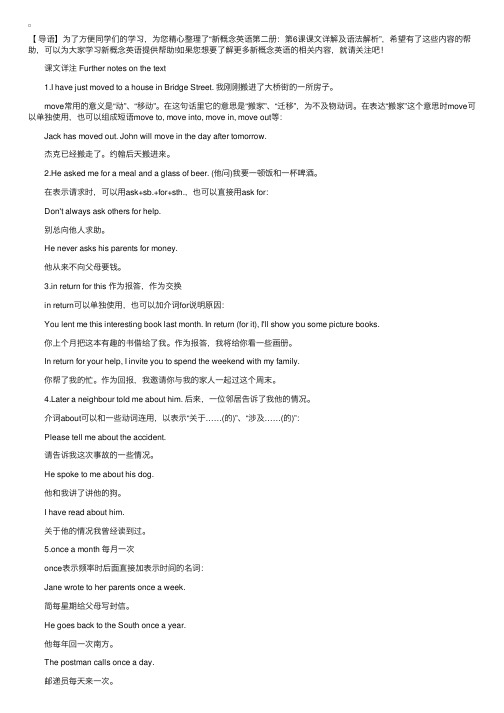
【导语】为了⽅便同学们的学习,为您精⼼整理了“新概念英语第⼆册:第6课课⽂详解及语法解析”,希望有了这些内容的帮助,可以为⼤家学习新概念英语提供帮助!如果您想要了解更多新概念英语的相关内容,就请关注吧! 课⽂详注 Further notes on the text 1.I have just moved to a house in Bridge Street. 我刚刚搬进了⼤桥街的⼀所房⼦。
move常⽤的意义是“动”、“移动”。
在这句话⾥它的意思是“搬家”、“迁移”,为不及物动词。
在表达“搬家”这个意思时move可以单独使⽤,也可以组成短语move to, move into, move in, move out等: Jack has moved out. John will move in the day after tomorrow. 杰克已经搬⾛了。
约翰后天搬进来。
2.He asked me for a meal and a glass of beer. (他问)我要⼀顿饭和⼀杯啤酒。
在表⽰请求时,可以⽤ask+sb.+for+sth.,也可以直接⽤ask for: Don't always ask others for help. 别总向他⼈求助。
He never asks his parents for money. 他从来不向⽗母要钱。
3.in return for this 作为报答,作为交换 in return可以单独使⽤,也可以加介词for说明原因: You lent me this interesting book last month. In return (for it), I'll show you some picture books. 你上个⽉把这本有趣的书借给了我。
作为报答,我将给你看⼀些画册。
In return for your help, I invite you to spend the weekend with my family. 你帮了我的忙。
新概念英语第二册Lesson20Onemaninaboat课文讲义

新概念英语第二册第20课Lesson 20: One man in a boat 独坐孤舟Fishing is my favourite sport. I often fish for hours without catching anything. But this does not worry me. Some fishermen are unlucky. Instead of catching fish, they catch old boots and rubbish. I am even less lucky. I never catch anything -- not even old boots. After having spent whole mornings on the river, I always go home with an empty bag. 'You must give up fishing!' my friends say. 'It's a waste of time.' But they don't realize one important thing. I'm not really interested in fishing. I am only interested in sitting in a boat and doing nothing at all! New words and expressions 生词和短语catch v. 抓到(caught, caught)fisherman n. 钓鱼人,渔民boot n. 靴子waste n. 浪费realize v. 意识到参考译文钓鱼是我特别喜爱的一项运动。
我经常一钓数小时却一无所获,但我从不为此烦恼。
有些垂钓者就是不走运,他们往往鱼钓不到,却钓上来些旧靴子和垃圾。
新概念英语第二册第六课课文详解
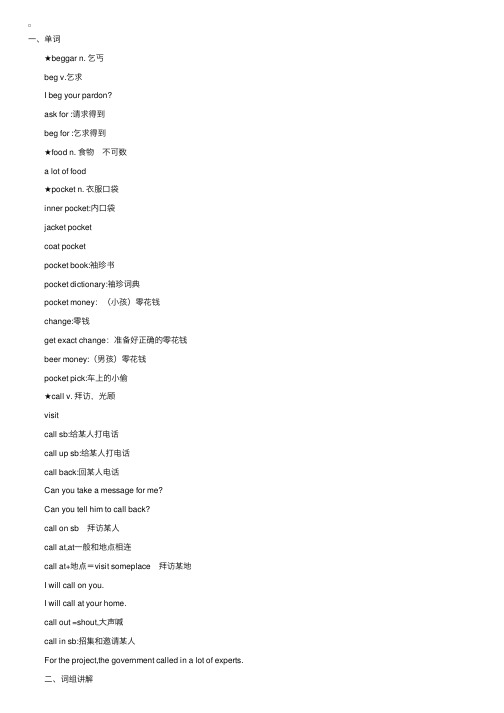
⼀、单词 ★beggar n. 乞丐 beg v.乞求 I beg your pardon? ask for :请求得到 beg for :乞求得到 ★food n. ⾷物 不可数 a lot of food ★pocket n. ⾐服⼝袋 inner pocket:内⼝袋 jacket pocket coat pocket pocket book:袖珍书 pocket dictionary:袖珍词典 pocket money:(⼩孩)零花钱 change:零钱 get exact change:准备好正确的零花钱 beer money:(男孩)零花钱 pocket pick:车上的⼩偷 ★call v. 拜访,光顾 visit call sb:给某⼈打电话 call up sb:给某⼈打电话 call back:回某⼈电话 Can you take a message for me? Can you tell him to call back? call on sb 拜访某⼈ call at,at⼀般和地点相连 call at+地点=visit someplace 拜访某地 I will call on you. I will call at your home. call out =shout,⼤声喊 call in sb:招集和邀请某⼈ For the project,the government called in a lot of experts. ⼆、词组讲解 1、knock [动词] ①敲,打(某物) 例句:He knocked several times on the window. 他敲了⼏下窗。
②批评,数落 例句:This magazine seems to be fond of knocking Lindsay Lohan's private life. 这家杂志似乎很热衷挖苦林赛o罗韩的私⽣活。
新概念英语第二册:第30课课文详解及语法解析.doc

新概念英语第二册:第30课课文详解及语法解析课文详注 Further notes on the text1.The Wayle is a small river that cuts across the park near my home. 威尔河是横穿过我家附近公园的一条小河。
在这句话中,that引导的定语从句修饰 a small river,关系代词that在从句中作主语。
地点状语 near my home修饰 thepark。
2.I like sitting by the Wayle on fine afternoons. 我喜欢在天气晴朗的下午到河边坐坐。
(1)by在此处表示“在……旁边/近旁”。
(2)afternoon为复数形式,表示经常性的情况,所以谓语为一般现在时。
因为afternoon前面有修饰词,所以要用介词on。
morning,evening与它的用法一致。
试比较:He came to the office in the afternoon.他下午去了办公室。
He met John on Sunday/on a fine afternoon.他在星期天/在一个晴朗的下午遇见了约翰。
Will you come to the meeting this/tomorrow afternoon?你来参加今天/明天下午的会吗?(在this ,tomorrowr ,yesterday等前面不加介词)This happend on the afternoon of May22.这事发生于5月22日下午。
(请注意在the afternoon of May22之前要用介词on)3.…it went towards a passing boat.……球便向着一只划过来的小船飞去。
(1)go在此处不是指人“走”,而是指球“行进”。
(2)passing为现在分词,作定语,表示“经过的”、“划过来的”,如a passing plane(一架飞过的飞机)。
_新概念英语第二册第14课 课文详解、翻译及语法

Lesson 14Do you speak English?你会讲英语吗?First listen and then answer the question.听录音,然后回答以下问题。
Did the young man speak English?I had an amusing experience last year. After I had left a small village in the south of France, I drove on to the next town. On the way, a young man waved to me. I stopped and he asked me for a lift. As soon as he had got into the car, I said good morning to him in French and he replied in the same language. Apart from a few words, I do not know any French at all. Neither of us spoke during the journey. I had nearly reached the town, when the young man suddenly said, very slowly, "Do you speak English?' As I soon learnt, he was English himself!'New words and expressions 生词和短语amusing adj. 好笑的,有趣的experience n. 经历wave v. 招手lift n. 搭便车reply v. 回答language n. 语言journey n. 旅行参考译文去年我有过一次有趣的经历。
(完整版)新概念英语第二册:第14课课文详解及语法解析

新概念英语第二册:第14课课文详解及语法解析课文详注 Further notes on the text1.After I had left a small village in the south of France, I drove on to the next town.在离开法国南部的一个小村庄后,我继续驶往下一个城镇。
(1)表示一个大范围中的某一个地方时要用介词in:Beijing is in the north of China.北京位于中国的北部。
(2)副词on紧跟在动词后面时能够表示“向前”、“继续下去”等意义:He talked on until everybody had gone.他滔滔不绝地讲到大家都走了。
I was reading when my friend called. After he had gone,I went on to read.我朋友来看我时我正在看书。
他走了以后我便继续看书。
2.I stopped and he asked me for a lift.我把车停下,他向我提出要求搭车。
名词lift的含义之一是“(给步行者)搭便车”、“免费搭车”:Last night, I had to walk home. No one would give me a lift.昨晚我不得不走回家。
谁也不愿意让我搭车。
I was lucky today. I got a lift soon after I had leftthe village.我今天运气好,离开村子不久就搭上了便车。
3.As soon as he had got into the car, I said goodmorning to him in French and he replied in the same language.他一上车,我就用法语向他问早上好,他也同样用法语回答我。
(1)表示时间的固定短语as soon as通常表示“一……就……”,即两个动词之间相隔时间非常短:Tell him the news as soon as you meet him.你一遇见他就把这消息告诉他。
(完整版)新概念英语第二册:第7课课文详解及语法解析
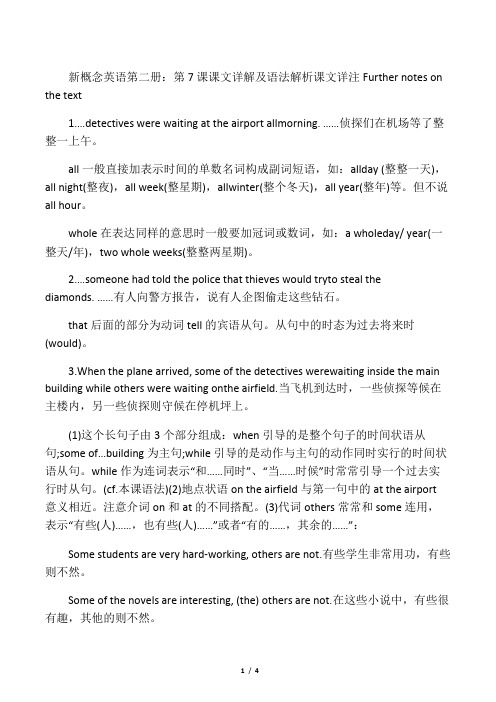
新概念英语第二册:第7课课文详解及语法解析课文详注Further notes on the text1.…detectives were waiting at the airport allmorning. ……侦探们在机场等了整整一上午。
all一般直接加表示时间的单数名词构成副词短语,如:allday (整整一天),all night(整夜),all week(整星期),allwinter(整个冬天),all year(整年)等。
但不说all hour。
whole在表达同样的意思时一般要加冠词或数词,如:a wholeday/ year(一整天/年),two whole weeks(整整两星期)。
2.…someone had told the police that thieves would tryto steal the diamonds. ……有人向警方报告,说有人企图偷走这些钻石。
that后面的部分为动词tell的宾语从句。
从句中的时态为过去将来时(would)。
3.When the plane arrived, some of the detectives werewaiting inside the main building while others were waiting onthe airfield.当飞机到达时,一些侦探等候在主楼内,另一些侦探则守候在停机坪上。
(1)这个长句子由3个部分组成:when引导的是整个句子的时间状语从句;some of…building为主句;while引导的是动作与主句的动作同时实行的时间状语从句。
while作为连词表示“和……同时”、“当……时候”时常常引导一个过去实行时从句。
(cf.本课语法)(2)地点状语on the airfield与第一句中的at the airport意义相近。
注意介词on和at的不同搭配。
(3)代词others常常和some连用,表示“有些(人)……,也有些(人)……”或者“有的……,其余的……”:Some students are very hard-working, others are not.有些学生非常用功,有些则不然。
新概念英语第二册:第1课课文详解及语法解析
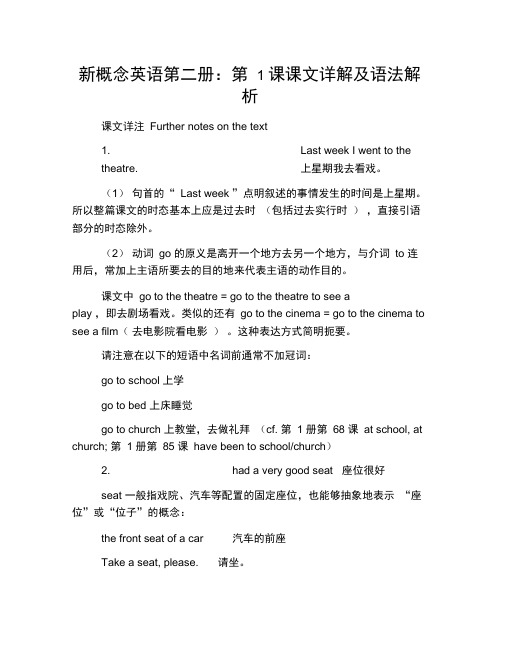
新概念英语第二册:第 1 课课文详解及语法解析课文详注Further notes on the text1. Last week I went to thetheatre. 上星期我去看戏。
(1)句首的“ Last week ”点明叙述的事情发生的时间是上星期。
所以整篇课文的时态基本上应是过去时(包括过去实行时),直接引语部分的时态除外。
(2)动词go 的原义是离开一个地方去另一个地方,与介词to 连用后,常加上主语所要去的目的地来代表主语的动作目的。
课文中go to the theatre = go to the theatre to see aplay ,即去剧场看戏。
类似的还有go to the cinema = go to the cinema to see a film(去电影院看电影)。
这种表达方式简明扼要。
请注意在以下的短语中名词前通常不加冠词:go to school 上学go to bed 上床睡觉go to church 上教堂,去做礼拜(cf. 第1 册第68 课at school, at church; 第1 册第85 课have been to school/church)2. had a very good seat 座位很好seat 一般指戏院、汽车等配置的固定座位,也能够抽象地表示“座位”或“位子”的概念:the front seat of a car 汽车的前座Take a seat, please. 请坐。
3. The play was very interesting. 戏很有意思。
interesting 属于现在分词形式的形容词,意思是“使人感兴趣”。
它通常与非人称主语连用或修饰某个事物:This is an interesting book/idea.这是一本有趣的书/ 一个令人感兴趣的主意。
4. …were sitting behind me. They were talking loudly.……坐在我的身后,大声地说着话。
新概念英语第二册第一课课文详解

【知识点讲解】 ⼀、单词扩展 1.privateadj.私⼈的,个⼈的,私有的 例句:It'smyprivateletter,youcan'treadit. 这是我的信,你不能看。
短语:inprivate秘密地,私下地privatelife私⽣活privateeducation私⼈办学;私⼈教育 说道私⼈教育,就得提到私⽴学校,在国外,有很多privateschool(私⽴学校),⽽国内的学校⼤多是公⽴学校(publicschool)。
2.conversationn.谈话 subjectofconversation话题。
例句:Fashionisalwaysasubjectofconversationamonggirls. 时尚总是⼥孩⼦们热衷的话题。
⼏种"谈话"的区别: talk普通⽤词,可与conversation换⽤,指正式交谈,也可指普通的闲谈。
gossip嚼⾆头,说长道短,也就是我们常说的⼋卦啦。
conversation⼀般⽤于正式⽂体中,指两个或更多⼈互相交换意见的交谈。
dialogue对话,可以指正式国家与国家会谈。
chat闲聊,就跟北京⼈说的“侃”,四川⼈说的“摆龙门阵”,武汉⼈说的“咵天”类似,说的是⽆关紧要的事。
例句:RussiaandJapanarehavingadialogue. 俄罗斯与⽇本正在进⾏会谈。
3.theatren.戏院,剧场,戏剧 知识扩展:cinema电* 例句:Smokingisbannedinthetheatre. 剧院禁⽌吸烟。
4.attentionn.注意 短语:payattention注意 payattentionto对……注意,也可⽤于指男⽣向⼥⽣献殷勤。
另外,to后⾯接动词时必须⽤动词ing结构。
(1)payattentiontosb./sth.注意;专注 (2)payalittleattentiontosb./sth.稍加注意 (3)paymuchattentiontosb./sth.多加注意 (4)paynoattentiontosb./sth.毫不注意……; 5.seat n.座位 这个词是考试中的热点。
新概念英语第二册第九课课文详解

Lesson 9 A cold welcome 冷遇 ⼀、⽣词讲解 1、welcome n. 欢迎;v. 欢迎 a cold welcome 冷遇 welcome to+地点 例如:welcome to China You are welcome./welcome adj.或You are welcome to+地点 例如:welcome to my home/welcome home/ welcome back 2、crowd n. ⼈群 crowd :in the crowd I spotted him in the crowd ⼀眼看见 a crowd of people 没有次序的⼈群,拥挤的⼈群 a group of people 有次序的⼈群 crowd v.拥挤,挤满 a large crowd of people ⼀⼤群⼈/crowds of people 许多⼈,⼈⼭⼈海 3、gather v. 聚集 people gathered ⼈们聚集在⼀起,尤指⾃发性的聚集 4、hand n. (表或机器的)指针 hand n.⼿ minute hand/second hand/hour hand second hand ⼆⼿的,旧的 wait me a moment/wait me a few seconds(for a few seconds.) 5、shout v. 喊叫 call out ⼤声喊叫 cry out ⼤声哭喊 scream 尖叫 ⼆、本⽂重点语法讲解 本篇课⽂的重点是时间介词的⽤法。
这部分知识点实⽤性很强,在PET, BETS2 中是必考项⽬,同时在⼩升初考试中也是完形填空常考知识点。
只要多⽐较,多练,通过造句⼦区分各个知识点,学⽣⼤部分都能将这部分知识点掌握好,尤其时想在考试中拿⾼分的学⽣,千万不要忽视这样的细节知识点哦! 让我们来看看具体的时间介词家族成员吧: At:表⽰在某时刻,时间,阶段,如at noon 在中午,at night在夜晚,还有具体时刻at 12 o'clock等;时刻前的介词⽤at:at five to twelve作时间状语 In :强调在⼀段时间内,如在早,午,晚in the morning, in the afteronno, in the evening. 课⽂中in twenty minutes' time 20分钟之后,in 表⽰在段时间以后,根据时态判别in 表⽰的含义。
新概念第二册课文精讲(含词汇讲解翻译)
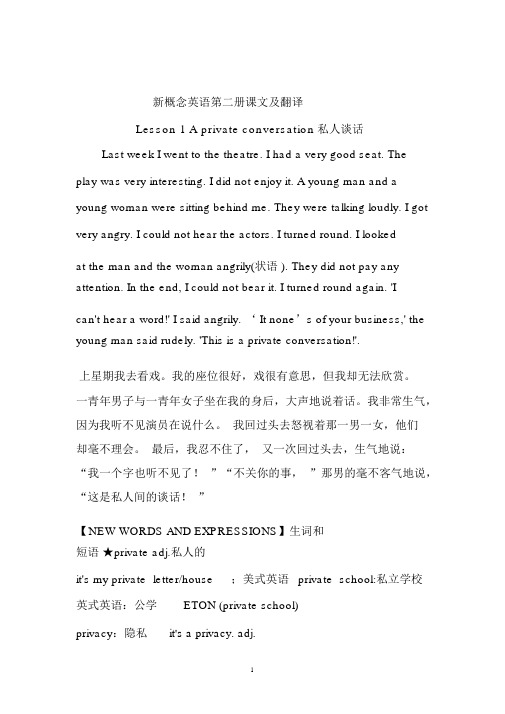
新概念英语第二册课文及翻译Lesson 1 A private conversation私人谈话Last week I went to the theatre. I had a very good seat. The play was very interesting. I did not enjoy it. A young man and a young woman were sitting behind me. They were talking loudly. I got very angry. I could not hear the actors. I turned round. I lookedat the man and the woman angrily(状语 ). They did not pay any attention. In the end, I could not bear it. I turned round again. 'Ican't hear a word!' I said angrily. ‘ It none’s of your business,' the young man said rudely. 'This is a private conversation!'.上星期我去看戏。
我的座位很好,戏很有意思,但我却无法欣赏。
一青年男子与一青年女子坐在我的身后,大声地说着话。
我非常生气,因为我听不见演员在说什么。
我回过头去怒视着那一男一女,他们却毫不理会。
最后,我忍不住了,又一次回过头去,生气地说:“我一个字也听不见了!”“不关你的事,”那男的毫不客气地说,“这是私人间的谈话!”【N EW WORDS AND EXPRESSIONS】生词和短语★private adj.私人的it's my private letter/house;美式英语private school:私立学校英式英语:公学ETON (private school)privacy:隐私it's a privacy. adj.《P rivate Ryan》 private soldier :大兵private life :私生Letter n. 首字母public:公众的,公开的public school ; public letter公开信;public place :公共场所★c onversation n.谈话 uni verse 转动 uniformUni--bi--tri--quar-pent-sex/hex-sept-oct-nov---decBilateral trade 双边贸易triangle quarter pentagon sex古罗马历法10 个月 ---12凯撒大帝julis---July七月屋大维augusto--August 八月September 九月 (原七月) ---septwolvesOctober 十月(原八月) ---octopusNovemberDecember----decadesubject of conversation :话题辨析: conversation, dialogue, talk, chat这些名词均含“交谈”之意。
新概念英语2课文解析
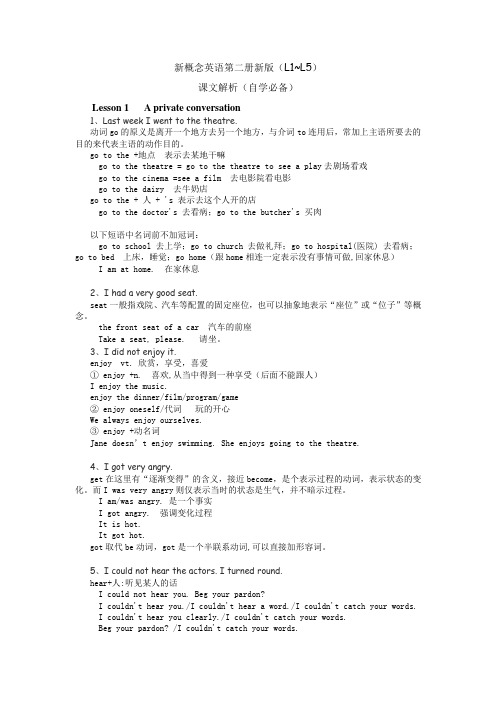
新概念英语第二册新版(L1~L5)课文解析(自学必备)Lesson 1 A private conversation1、Last week I went to the theatre.动词go的原义是离开一个地方去另一个地方,与介词to连用后,常加上主语所要去的目的来代表主语的动作目的。
go to the +地点表示去某地干嘛go to the theatre = go to the theatre to see a play去剧场看戏go to the cinema =see a film 去电影院看电影go to the dairy 去牛奶店go to the + 人 + 's 表示去这个人开的店go to the doctor's 去看病;go to the butcher's 买肉以下短语中名词前不加冠词:go to school 去上学;go to church 去做礼拜;go to hospital(医院) 去看病;go to bed 上床,睡觉;go home(跟home相连一定表示没有事情可做,回家休息)I am at home. 在家休息2、I had a very good seat.seat一般指戏院、汽车等配置的固定座位,也可以抽象地表示“座位”或“位子”等概念。
the front seat of a car 汽车的前座Take a seat, please. 请坐。
3、I did not enjoy it.enjoy vt. 欣赏,享受,喜爱① enjoy +n. 喜欢,从当中得到一种享受(后面不能跟人)I enjoy the music.enjoy the dinner/film/program/game② enjoy oneself/代词玩的开心We always enjoy ourselves.③ enjoy +动名词Jane doesn’t enjoy swimming. She enjoys going to the theatre.4、I got very angry.get在这里有“逐渐变得”的含义,接近become,是个表示过程的动词,表示状态的变化。
新概念英语第二册(第一课)课文详解

She loves to gossip to her neighbors.
她喜欢议论邻居们的是非长短。 gossip to sb. 讨论某人的是非
She's a terrible gossip. 她专爱说人闲话。
课文语言点详解
Last week, I went to the theatre.
They made the secret public. 他们公开了这个秘密。
a danger to public health
对公众健康的威胁
Smoking is not allowed in public places.
禁止在公众场合吸烟。
privacy n. 隐私
Newspapers often don't respect the individual's right to privacy.
Talk with/to sb about sth
I had a long talk with the headmaster about my son. 关於我儿子的问题我与校长谈
了很长时间.
而作复数时则常指政治家之间在庄 重的场合中进行的严肃谈话:
to hold peace talks 举行和谈
go to school 去上学; go to church 去做礼拜; go to hospital 去看病 go home 回家休息
[注]跟home相连一定表示没有事情可做,休闲
I had a very good seat.
考点:作为动词的seat与sit的区别 sit--vi; seat--vt seat sb 让某人就坐
新概念英语第二册第36课 课文详解、翻译及语法
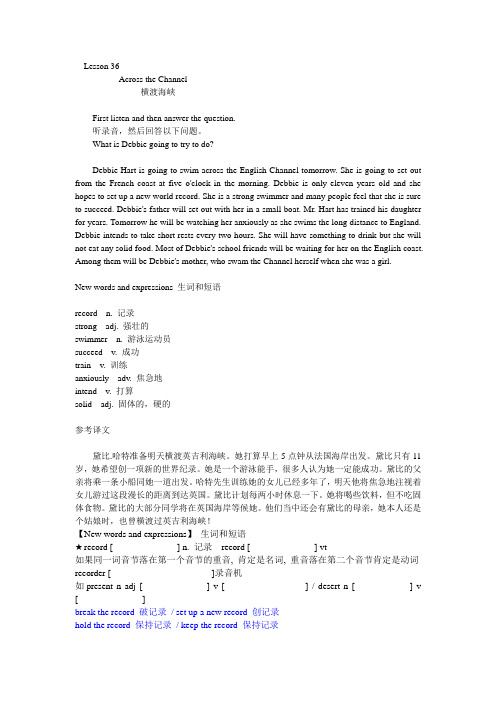
Lesson 36Across the Channel横渡海峡First listen and then answer the question.听录音,然后回答以下问题。
What is Debbie going to try to do?Debbie Hart is going to swim across the English Channel tomorrow. She is going to set out from the French coast at five o'clock in the morning. Debbie is only eleven years old and she hopes to set up a new world record. She is a strong swimmer and many people feel that she is sure to succeed. Debbie's father will set out with her in a small boat. Mr. Hart has trained his daughter for years. Tomorrow he will be watching her anxiously as she swims the long distance to England. Debbie intends to take short rests every two hours. She will have something to drink but she will not eat any solid food. Most of Debbie's school friends will be waiting for her on the English coast. Among them will be Debbie's mother, who swam the Channel herself when she was a girl.New words and expressions 生词和短语record n. 记录strong adj. 强壮的swimmer n. 游泳运动员succeed v. 成功train v. 训练anxiously adv. 焦急地intend v. 打算solid adj. 固体的,硬的参考译文黛比.哈特准备明天横渡英吉利海峡。
- 1、下载文档前请自行甄别文档内容的完整性,平台不提供额外的编辑、内容补充、找答案等附加服务。
- 2、"仅部分预览"的文档,不可在线预览部分如存在完整性等问题,可反馈申请退款(可完整预览的文档不适用该条件!)。
- 3、如文档侵犯您的权益,请联系客服反馈,我们会尽快为您处理(人工客服工作时间:9:00-18:30)。
新概念英语第二册课文详解
新概念英语第二册课文详解
课文详注一Furthernotesonthetext
stweekIwenttothetheatre.上星期我去看戏。
(1)句首的“Lastweek”点明叙述的事情发生的时间是上星期。
因此整篇课文的时态基本上应是过去时(包括过去进行时),直接引语部分的时态除外。
(2)动词go的原义是离开一个地方去另一个地方,与介词to连用后,常加上主语所要去的目的地来代表主语的动作目的。
课文中gotothetheatre=gotothetheatretoseeaplay,即去剧场看戏。
类似的还有gotothecinema=gotothecinematoseeafilm(去电影院看电影)。
这种表达方式简明扼要。
请注意在以下的短语中名词前通常不加冠词:
gotoschool上学
gotobed上床睡觉
gotochurch上教堂,去做礼拜(cf.第1册第68课
atschool,atchurch;第1册第85课havebeentoschool/church)
2.hadaverygoodseat座位很好
seat一般指戏院、汽车等配置的固定座位,也可以抽象地表示“座位”或“位子”的概念:
thefrontseatofacar汽车的前座
Takeaseat,please.请坐。
3.Theplaywasveryinteresting.戏很有意思。
interesting属于现在分词形式的形容词,意思是“使人感兴趣”。
它通常与非人称主语连用或修饰某个事物:
Thisisaninterestingbook/idea.
这是一本有趣的书/一个令人感兴趣的主意。
4.…weresittingbehindme.Theyweretalkingloudly.……坐在我的身后,大声地说着话。
这两句的时态为过去进行时。
(cf.第7课语法)
5.Igotveryangry.我变得非常生气。
get在这里有“逐渐变得”的含义,接近become,是个表示过程的动词,表示状态的变化。
而Iwasveryangry则仅表示当时的状态是生气,并不暗示过程。
6.intheend最后,终于
表示一段较长的时间之后或某种努力之后:
Shetriedhardtofinishherhomeworkbyherself.Intheend,shehad toaskherbrotherforhelp.
她试图自已完成家庭作业,但最后她不得不请她兄弟帮忙。
7.noneofyourbusiness不关你的事
(1)sb.'sbusiness某人(所关心的或份内)的事
Itismybusinesstolookafteryourhealth.
我必须照顾你的身体健康。
Thisisnoneofhisbusiness.
这根本不关他的事。
(2)表示否定的代词none意义上相当于notany或noone,但语
气较强:
Shekeptnoneofhisletters.
他的信件她一封也没有保留。
Noneofmyfriendsleftearly.
我的朋友没有一个早离开的。
noneof这个短语有时可以表达一种断然、甚至粗暴的口气,
尤其是在祈使句中:
Noneofyoursillyremarks!
别说傻话了!
8.aprivateconversation私人间的谈话
在西方文化中人们对private(私人的,个人的)这个概念很看重。
这个词的名词形式privacy有“隐私(权)”的意思。
所以课文中的
小伙子会振振有词地说“Thisisaprivateconversation!”不过他忘
了他是在一个publicplace(公众场合),而且他们的说话声太大,
已经影响了别人。
课文详注二Furthernotesonthetext
1.ItwasSunday.那是个星期天。
在句子中,我们常常用it指时间、天气、温度或距离。
这种it
有时被称为“虚主语”(emptysubject),因为它没有实际意义。
它
之所以存在,是因为英语句子必须包含主语和谓语。
请注意以下例句:
表示时间:
Itis8o'clock.
8点了。
表示天气:
It'srainingagain.
又下雨了。
Itiscold.
天气冷。
表示环境:
Itwasdarkoutside.
外面一片漆黑。
作为第3人称单数的中性代词,it可以指一件东西、一个事件或者用来指是什么人:
ItwasmyauntLucy.
是我姑母露西。
(打来电话者)
Itisalovelybaby.
真是个可爱的小宝宝。
2.onSundays在星期天的时侯
(1)复数形式指每个星期日,或大部分星期日,与一般现在时连用,表示经常性的行为:
WedonotgotoschoolonSundays.
星期天我们不上学。
InevergetupearlyonSundays.
星期天我从来不早起。
(2)介词on一般用于表示某一天的时间短语中:
onMonday星期一
onFriday星期五
onMondaymorning在星期一早上
onthatday在那一天
当我们使用last,next和this,that时,介词(以及定冠词)必须省略:
I'llseeyounext/thisFriday.
下个/这个星期五再见。
LastSundayIgotupverylate.
上个星期天我起得很晚。
3.Isometimesstayinbeduntillunchtime.有时我要一直躺到吃午饭的时候。
(1)在表达卧床的意思时bed前不需加冠词:
Youmuststay/remaininbedforanothertwodays.
你必须再卧床两天。
Whattimedidyougotobedlastnight?。
